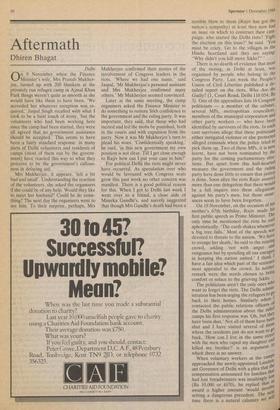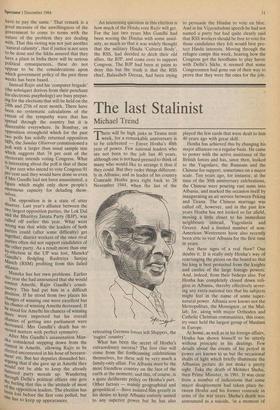Aftermath
Dhiren Bhagat
Delhi On 9 November when the Finance Minister's wife, Mrs Pranab Mukher- jee, turned up with 200 blankets at the privately run refugee camp in Ajmal Khan Park things weren't quite as smooth as she would have like them to have been. 'We accorded her whatever reception was, re- quired,' Jaspal Singh recalled with what I tooi to be a faint touch of irony, 'but the volunteers who had been working here since the camp had been started, they were all agreed that no government assistance should be accepted.' This seems to have been a fairly standard response: in many parts of Delhi volunteers and residents of camps (most of them run by the govern- ment) have reacted this way to what they perceive to be the government's callous- ness in delaying aid.
Mrs Mukherjee, it appears, 'felt a bit bad and small'. Understanding the reaction of the volunteers, she asked the organisers if she could be of any help. Would they like to meet her husband? Could he do some- thing? The next day the organisers went to see him. To their surprise, perhaps, Mrs
Mukherjee confirmed their stories of the involvement of Congress leaders in the riots. 'Where we had one name,' said Jaspal, 'Mr Mukherjee's personal assistant and Mrs Mukherjee confirmed many others.' Mr Mukherjee seemed convinced.
Later at the same meeting, the camp organisers asked the Finance Minister to do something to restore Sikh confidence in the government and the ruling party. It was important, they said, that those who had incited and led the mobs be punished, both in the courts and with expulsion from the party. Now it was Mr Mukherjee's turn to plead his woes. 'Confidentially speaking,' he said, 'in this new government my own position is not clear. Till I get close enough to Rajiv how can I put your case to him?'
For political Delhi the riots might never have occurred. As speculation over who would be favoured with Congress seats grew this past week no other concern was manifest. There is a good political reason for this. When I got to Delhi last week I went over to a friend, a close aide of Maneka Gandhi's, and naively suggested that though Mrs Gandhi's death had been a terrible blow to them (Rajiv has got the nation's sympathy) at least they now had an issue on which to construct their cam-
paign: who started the Delhi riots? 'Fight the election on this issue?' he said. 'Yea
must be crazy. Go to the villages in the Hindu heartland and they are saying: "Why didn't you kill more Sikhs?" ' There is no dearth of evidence that most of the rioting, in Delhi at least, was organised by people who belong to the
Congress Party. Last week the People's Union of Civil Liberties published a de- tailed report on the riots, Who Are the Guilty? (1, Court Road, Delhi 110 054, Rs 3). One of the appendices lists 16 Congress politicians — a member of the cabinet, several MPs, metropolitan councillors, members of the municipal corporation and other party workers — who have been identified by survivors of the riots. In each case survivors allege that these politicians either instigated violence or else protected alleged criminals when the police tried to pick them up. Two of these MPs, it is now learnt, have not been nominated by the party for the coming parliamentary eta; tions. But apart from this half-hearted measure the government and the ruling party have done little to ensure that justice is done. Soon after the riots Rajiv assured more than one delegation that there would be a full inquiry into these allegations against his party's men, but those assur- ances seem to have been forgotten. On 19 November, on the occasion of his mother's 67th birthday, Rajiv made his first public speech as Prime Minister. The, only time he mentioned the riots he sal') aphoristically: The earth shakes whenever a big tree falls.' Most of the speech was devoted to threats to the nation. 'We have to avenge her death,' he said to the roaring, crowd, adding 'not with anger and vengeance but by spending all our energies in keeping the nation united.' I think , have a fair idea which part of the sentence most appealed to the crowd. In neither remark were the words chosen to bring comfort or solace to the grieving Sikhs. The politicians aren't the only ones Wh° want to forget the riots. The Delhi admin- istration has been urging the refugees to g°, back to their homes. Similarly when contacted the public relations officers °: the Delhi administration about the relief camps his first response was 'Oh, but they have been shut.' Not all of them have bee° shut and I have visited several of thet° where the residents just do not want to gu, back. 'How can I live in the same strec; with the men who raped my daughter an killed my brother?' is an argument to which there is no answer. When voluntary workers at the cams approached the newly-appointed Lietitehli; ant Governor of Delhi with a plea that the compensation announced for families thao, had lost breadwinners was insultingly I°, (Rs 10,000 or £670), he replied that iv award a higher amount 'would inv°Iv..ct setting a dangerous precedent. The neili time there is a natural calamity we w
have to pay the same.' That remark is a good measure of the unwillingness of the government to come to terms with the nature of the problem they are dealing with. That this rioting was not just another `natural calamity', that if justice is not seen to be done and the Sikhs assured that they have a place in India there will be serious political consequences, these do not appear to be the considerations upon which government policy of the past three weeks has been based.
Instead Rajiv and his 'computer brigade' (the sobriquet derives from their penchant for electronic psephology) are busy prepar- ing for the elections that will be held on the 24th and 27th of next month. There have been no systematic calculations of the extent of the sympathy wave that has spread through the country but it is discernible everywhere. In Bombay, an opposition stronghold which for the past two polls has solidly returned opposition MPs, the Sunday Observer commissioned a Poll with a larger than usual sample size which suggests that 74 per cent of the electorate intends voting Congress. What is interesting about the poll is that of these 74 per cent who intend to vote Congress 91 Per cent said they would have done so even if Mrs Gandhi had not been assassinated, a figure which might only show people's enormous capacity for deluding them- selves.
The opposition is in a state of utter disarray. Last year's alliance between the two largest opposition parties, the Lok Dal and the Bharitya Janata Party (BJP), was called off earlier this year. What went wrong was that while the leaders of both Parties could (after some difficulty) get together, district workers of the once rival Parties often did not support candidates of the other party. As a result more than one 4-election in the UP was lost, Maneka' Gandhi's fledgling Rashtriya Sanjay Manch (RSM) profiting from this failed alliance.
Maneka has her own problems. Earlier this year she had announced that she would contest Amethi, Rajiv Gandhi's consti- tuency. This had put him in a difficult Position. If he stood from two places his changes of winning one were excellent but he chance of winning Amethi decreased. If no stood for Amethi his chances of winning there were improved but his overall chances of getting into parliament were decreased. Mrs Gandhi's death has re- versed matters with perfect symmetry. After Mrs Gandhi's assassination Man- eka considered stepping down from the co. ntest in Amethi, `allowing Rajiv to be elected uncontested in his hour of bereave- :lent' etc. But her deputies dissuaded her, arguing that if she gave up at Amethi they Would not be able to keep the already battered party morale up. Wandering Trough Delhi's political offices one gets utfe feeling that this is the attitude of most o the Opposition leaders. The election has been lost before the first vote polled, but one has to keep up appearances.
An interesting question in this election is how much of the Hindu vote Rajiv will get. For the last two years Mrs Gandhi had been wooing the Hindus with some assid- uity, so much so that it was widely thought that the military Hindu 'Cultural Body', the RSS, had decided to ditch their old allies, the BJP, and come over to support Congress. The BJP had been at pains to deny this but the truth is that the RSS chief, Balasaheb Deoras, had been trying to persuade the Hindus to vote en bloc. And in his Vijayadashmi speech he had not named a party but had quite clearly said that RSS workers should be free to vote for those candidates they felt would best pro- tect Hindu interests. Moving through the refugee camps this week, hearing how the Congress got the hoodlums to play havoc with Delhi's Sikhs, it seemed that some Congressmen had gone out of their way to prove that they were the ones for the job.























































 Previous page
Previous page